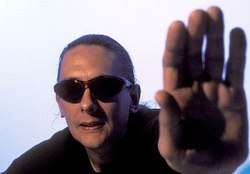Colin Faver
Colin Faver (24 December 1951 – 5 September 2015) was a British club and radio DJ, best known for his 1990s cutting-edge show on London's Kiss FM, and an important figure in the development of British club culture.
Colin Faver | |
|---|---|
 | |
| Background information | |
| Birth name | Colin Faver |
| Born | 24 December 1951 London, England |
| Died | 5 September 2015 |
| Genres | Acid house, house, techno, breakbeat hardcore |
| Occupation(s) | DJ, label owner, producer |
Biography
Colin Faver was born in East London, and originally started out working in the Small Wonder record shop in Walthamstow. He became a big fan of punk rock, post-punk and new wave.[1] His first 'DJ break' was when he asked to stand in for the regular DJ at London's Marquee Club.
In the late 1970s/early 1980s, he was part of Final Solution with Kevin Millins, a promotions agency which publicised bands including Throbbing Gristle, New Order, and Culture Club.[2]
Between 1982 and 1988, Faver was resident at Camden Palace (with Mr. C and Evil Eddie Richards), where he played a heady mix of soul, disco, hip hop, Hi-NRG, electro and early house music and at the Hedonism parties in early 1988. At that time he was one of the founder members of then pirate radio station Kiss FM, where he brought the same selection of music onto the radio.[3] Faver held down residencies at clubs such as Pyramid and Rage at Heaven, The Wag, as well as regular guest slots at clubs such as Shoom (run by fellow Kiss DJ Danny Rampling), Nude at The Haçienda in Manchester, and increasingly travelling around the UK to play at raves especially during the acid house and Second Summer of Love period of 1988/1989.
By the time Kiss FM had become a legal radio station in 1990, his show was focused on techno, house and breakbeat hardcore. Both his and fellow DJ Colin Dale's groundbreaking early 1990s shows on the station are regularly credited as being an important education and influence.[4][5]
His Demo DAT section on the show became increasingly important to showcase new and unsigned British material, and it was through this that both Digeridoo by Aphex Twin,[6] and the debut EP by Force Mass Motion would first get played. Both would also be released on the Rabbit City Records label that he and DJ/producer Gordon Matthewman (aka DJ Edge) started in 1991. The first release on the label was their own production Cutter Mix / Beyond Control.
Between 1992 and 1993, Faver ran the midweek London techno clubnight Knowledge at the SW1 Club with Jane Howard, partner Brenda Russell, and Colin Dale.[7]
Faver departed Kiss in June 1997. From 2006 to 2012, he hosted regular shows playing house and soul on Solar Radio. His most recent radio broadcasting was on the London station Mi-Soul in 2014.
Faver died of multiple organ failure on 5 September 2015.[8]
Discography
- Cutter Mix / Beyond Control (as Razorboy & Mirrorman with Gordon Edge) (Rabbit City, 1991)
- Techmix: On the Decks with Colin Faver (DJ Mix) (Kickin Records, 1998)
- Rewind: The Classics Volume 2 (DJ Mix) (UCMG, 2000)
References
- "Colin Faver, DJ - obituary". Telegraph. 8 September 2015.
- "Colin Faver RIP". Test Pressing. 7 September 2015.
- Phil Cheeseman (7 June 2016). "The Story of Hedonism by Phil Cheeseman". Hedonism1988.co.uk.
- Joe Muggs (8 September 2015). "Colin Faver rarely made the headlines, but supported dance music culture to the end". FACTmag.
- Angus Harrison (7 September 2015). "How Colin Faver and His Kiss FM Show "Influenced an Entire Generation of Ravers"". Vice (Thump).
- Lauren Martin (7 September 2015). "RIP Colin Faver". RBMA Daily. Archived from the original on 4 April 2019. Retrieved 29 September 2018.
- Oli Warwick (16 July 2015). "The Untold Story of London Techno 1989-1997". RDMA Daily. Archived from the original on 4 April 2019. Retrieved 29 September 2018.
- Thomas Green (7 September 2015). "RIP Colin Faver: our obituary". MixMag.
External links
- Colin Faver discography at Discogs
- Rabbit City Records discography at Discogs